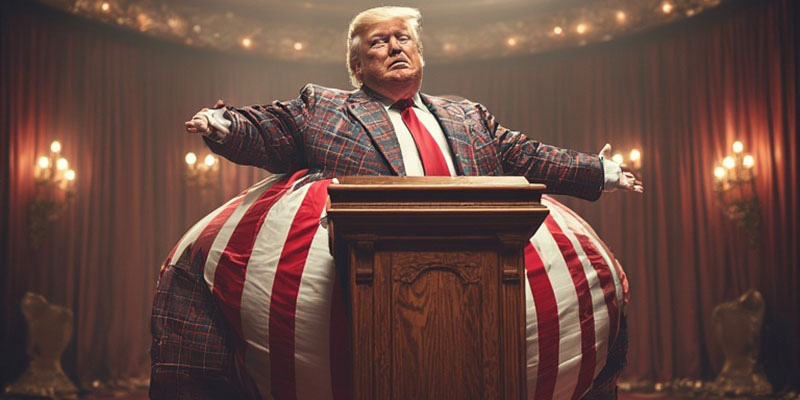In the dimly lit corridors of gleaming power—where words drip like oil and promises twist like barbed wire—the great swine in charge of markets and militarism, the capricious overseers of spectacle, have unveiled their latest farce: a plan to slap a Titanic, bludgeoning 100 percent tariff on semiconductors imported from across the Pacific. These chips—those chips, mind you—are the “steel of the modern age,” a phrase so ludicrously heralded it rings hollow from their lips.
And who stands behind this grotesquery? Donald Trump, that bloated pantomime of governance, grunted at his podium, as if reciting from a carnival sideshow script. “You will build them here,” he blubbered, “or else.” A barking demand, injected into the world through the institutional sausage grinder of spectacle, designed not to protect or to preserve but to peddle avarice and illusion.
Across the world, TSMC, Samsung, SK Hynix—titanic factories and dream factories all—stand at the edge of these shifting tectonics, their leaders huddled in boardrooms, counting costs, tallying the collapse of supply lines. And the rest of us—citizens, laborers, small-business owners—watch with flattened hearts, wondering how to maintain balance when the pillars beneath us are pried out for profit.
But among the masses—that great, living weave of communities—something quieter, resilient, and more luminous stirs. A teacher in a sunlit classroom calmly stated, with quiet clarity, that innovation should serve people, not power. A factory technician politely requested that the gears of progress not be greased with the oil of exploitation. Across coffee shops and union halls, softly spoken, voices measure compassion, interconnection, rooted integrity.
There is Zen in their resolve, Tao in their refusal to be swallowed by the grand narrative of dominance. They know that chips are not soldiers, that circuits do not owe allegiance to the State, that technology’s true purpose is not spectacle but sustaining life’s intricate harmony. Their words may be humble, but their truth is luminous—an antidote to the deafening roar of capitalist drag shows masquerading as governance.
Meanwhile, corporate executives—those vaunted puppets of Wall Street’s Washington show—screeched assurances about “national security,” bellowed of “domestic renewal,” and howled at any hint of dissent. Their rhetoric, devoid of nuance and dripping with spectacle, reveals their sole devotion: toward stock tickers padded in the night by insider symphonies, toward the theatrical machinery of debt and delusion.
It is a con: Wall Street and Washington, locked in an incestuous embrace, spinning stories of threat and triumph, distracting the world with tariffs and headlines, while the gears of oppression turn ever more furiously. Truth, nuance, and the public good? Trampled beneath their heavy boots—boots polished by spin, greed, and grandstanding.
Yet the real protagonists remain beyond the glare of their footlights: the whistleblower in a dim-lit factory floor, the single parent struggling to keep lights on, the young engineer teaching themselves ethical design in a cramped apartment—these are the ones who embody interconnectedness, humility, compassion. They move not with spectacle, but with quiet intention; not with self-service, but with shared purpose.
Conclusion: The Quiet Urgency of Fundamental Change
If we are honest with ourselves—if we listen to those humble souls speaking in murmurs of clarity—we see that fundamental transformation is no longer a lofty idea. It is our only horizon. The spectacle must end: the tariff threats, the corporate puppeteering, the Washington–Wall Street con. Instead, we must awaken to a world not built on coercion or curated media dramas, but on collective integrity and systems alive with mutual responsibility.
This radical shift—this unfolding liberation of consciousness—echoes the subtleties of a philosophic insight that insists: transformation does not arise from more power, more policy, more spectacle. It emerges from the end of divided self, from seeing reality without the filter of authority or ideology. Only then can we break the spell of our own making, and walk together into a future grounded in awareness, connectedness, and uncompromised justice.
Let that be the legacy we choose: not another tariff headline to distract, but a deeper change in how we relate to one another, to our machines, to the Earth—quietly profound, radically simple, unwaveringly humane.
Sources:
- Trump’s threat to impose 100% tariffs on semiconductor imports and its implications Technology Magazine.
